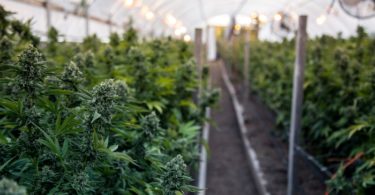The marijuana industry has been making noise for years, but it really made a name for itself in 2018.
Even though pot stocks were mostly a buzzkill last year, the industry gained validity like never before in North America. We saw Canada end nine decades of recreational marijuana prohibition by becoming the first industrialized country in the world to green-light adult-use pot. This should, in all likelihood, have billions of dollars in added annual income flowing into the legal weed industry.
We also saw impressive advancements in the U.S. with the FDA’s first approval of a cannabis-derived drug, and with President Trump’s December signing of the Farm Bill, which legalized hemp and hemp-based cannabidiol (CBD) oil.
Four marijuana stocks that could deliver the green in 2019
But with a new year comes a new way to analyze marijuana stocks, now that the legalization movement has really picked up. No longer are promises enough to push pot stocks higher. Rather, Wall Street and investors are looking for tangible evidence of this industry’s potential, which means strong sales growth and, most importantly, profits.
Of course, profitability isn’t as cut-and-dried as you might think with marijuana stocks. That’s because fair-value adjustments on biological assets tied to International Financial Reporting Standards (IFRS) can cause wild vacillations in a company’s bottom line. If we’re talking about legitimate profitability (i.e., a higher gross profit, sans any adjustments, than operating expenses), there are four pot stocks that could deliver the green in 2019.

IMAGE SOURCE: GETTY IMAGES.
OrganiGram Holdings
The grower with the best shot of generating a legitimate profit that doesn’t include a number of one-time benefits or fair-value adjustments is Maritime-based OrganiGram Holdings(NASDAQOTH:OGRMF).
OrganiGram comes to the table with a couple of competitive operating advantages. To begin with, whereas most of the top-tier producers have their production facilities spread out within a province or across Canada, OrganiGram has chosen to focus solely on its Moncton, New Brunswick, location. Operating in a single location should lead to reduced supply chain and shipping expenses.
Speaking of its Moncton location, OrganiGram is projected to yield 113,000 kilograms of peak annual output across only 490,000 square feet of growing space. The reason it’s able to produce so much cannabis in such a small amount of space is that it’s employing a three-tiered growing system. This, too, will keep costs down, since the company doesn’t have to construct 1 million-plus square feet of greenhouses to achieve the same output as its peers.
OrganiGram is already producing 36,000 kilograms annually, and while phase 4 of its Moncton expansion will be ongoing into October, the company’s high-yield, low-cost production should lead to recurring (and legitimate) profitability in 2019.

IMAGE SOURCE: GETTY IMAGES.
Innovative Industrial Properties
Innovative Industrial Properties (NYSE:IIPR) is a cannabis real estate investment trust, and it probably has the best chance of any pure-play pot stock to be profitable this year.
The company’s business model is very simple: Purchase medical cannabis growing and/or processing facilities in the U.S., and lease these facilities out for an extended period of time. As of the end of 2018, it had leased 11 properties out for an initial length of 15 to 20 years, with annual rental increases and a 1.5% management fee built into these contracts. In other words, it’s primed to stay ahead of inflation while bringing in predictable amount of cash flow each year.
Innovative Industrial Properties has also benefited from a growing number of U.S. states that have passed legalization. Around two-thirds of the country has legalized medical weed in some capacity, with 10 states giving the thumbs-up to adult-use marijuana. As more states give cannabis the green light, Innovative Industrial Properties has incentive to acquire additional properties.
Although dilution could be an issue in the near-term for shareholders as the company bolsters its cash position, profitability looks to be nearly assured.

IMAGE SOURCE: GETTY IMAGES.
Trulieve Cannabis
Dispensary stocks will be spending big bucks in 2019 to expand their physical presence and build out their integrated capacity (e.g., growing and/or processing facilities), which means most won’t be profitable. The exception might be Trulieve Cannabis (NASDAQOTH:TCNNF).
Sure, roughly two-thirds of the U.S. has legalized marijuana in some capacity, but that doesn’t mean every market can be profitable. For Trulieve, the Florida medical cannabis market has been a blessing. Recently, the company opened its 22nd licensed dispensary in the state. As a vertically integrated dispensary, it’s able to offer more than 125 Trulieve-branded products to Florida’s medical marijuana patients. Being vertically integrated is also a smart way to control costs.
Also, since Florida tends to be a popular retirement destination, and older Americans are more likely to have an ailment that can be alleviated with cannabis use than younger Americans are, the state’s medical pot industry has the potential to top $1 billion in annual sales. Should Florida pass recreational legislation in say 2020, it would further open the door for Trulieve to succeed.
Perhaps the wild card here is the company’s expansion into California and Massachusetts by way of acquisitions. How aggressive Trulieve Cannabis gets with new store openings in these states will determine whether the company generates a legitimate operating profit in 2019.

IMAGE SOURCE: GETTY IMAGES.
Charlotte’s Web Holdings
A final pot stock with a decent chance to deliver a profit this year without the assistance of one-time benefits is cannabis oil retailer Charlotte’s Web Holdings (NASDAQOTH:CWBHF).
Before the December signing of the Farm Bill, Charlotte’s Web was already in about 3,000 retail locations in the United States. However, following the legalization of hemp-based CBD oil, it should be a lot easier for the company to boost the number of stores its products are sold in. More impressions and an opportunity to attract first-time consumers with hemp-based CBD products should drive higher sales.
CBD is an especially attractive product for pot stocks, given its high margin. CBD is the cannabinoid best known for its perceived medical benefits, and since it doesn’t get the user high, it’s more likely to be the choice of first-time users of cannabis products. Although Charlotte’s Web’s products haven’t received an FDA review, enough clinical evidence at the university level has been unearthed to encourage consumers to try hemp-based CBD oils for certain ailments.
Although Charlotte’s Web can be influenced by IFRS accounting, it’s capable of an operating profit sans one-time benefits in 2019.







How do you view the future potential growth of New Age Beverage?
I am not sure where you are getting your information, but good topic.I needs to spend some time learning much more orunderstanding more. Thanks for wonderful info I was looking for this info for my mission.